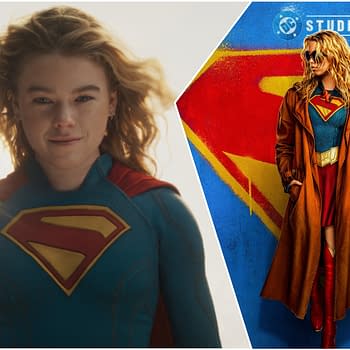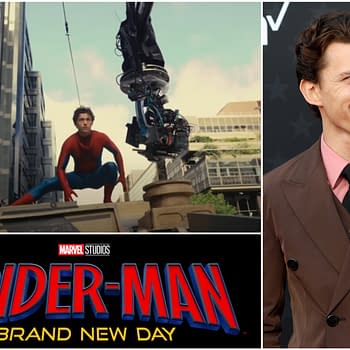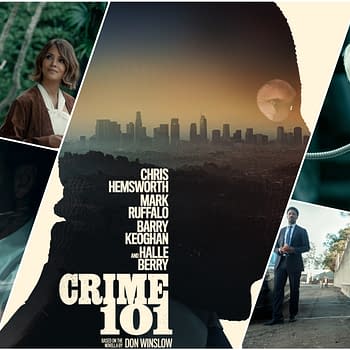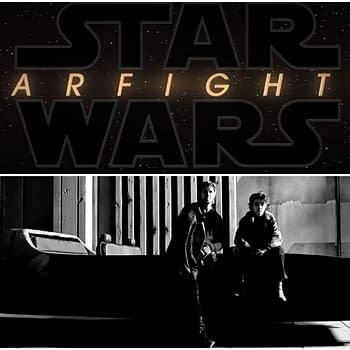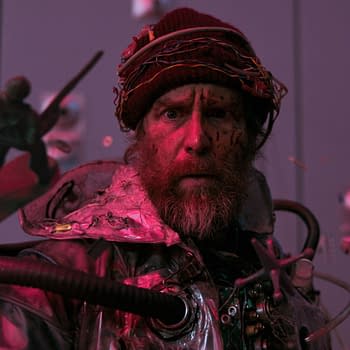Posted in: Movies | Tagged: comikaze, entertainment, film, james bond, Malcolm McNeill, pierce brosnan, Robert Short, sean connery, spy films, Steve jay Rubin, timothy dalton, Travis Langley, Vito Lappicola, William O'Neill, Zack Beseda
James Bond Aficionados Gather And Talk Best Bonds And Their Legacy At Comikaze
By Michele Brittany, a West Coast Bleeding Cool Correspondent
I was quite excited to find that there would be two panels featured at Stan Lee's Comikaze last week at the Los Angeles Convention Center. The first was held Friday evening titled Battle of the Bonds…James Bond and the second was on Saturday afternoon, titled 50 Years of James Bond – How Did He Become a Legend? Both panels had overlap of panelists and were moderated by Jessica Tseang.
Which Bond Does It Better?
The Battle of the Bonds…James Bond follows on the success of prior panels of the Robins and the Doctors and the goal is dissect each Bond to determine which one is the greatest Bond.
Each panelist represented a Bond:
- Barry Nelson, David Niven and Ian Fleming played by Dr. Travis Langley (author of Batman and Psychology: A Dark and Stormy Knight)
- Sean Connery played by Steven Jay Rubin (author of The James Bond Films: A Behind the Scenes History and The Complete James Bond Encyclopedia)
- George Lazenby played by Malcolm McNeill (international law attorney)
- Roger Moore played by William O'Neill (artist, initial creator of Hurricane Entertainment comic book, Chassis)
- Timothy Dalton played by Robert Short (actor, visual effects)
- Pierce Brosnan played by Zack Beseda (www.zackforreal.com)
- Daniel Craig played by Vito Lappicola (Comics on Comics)
Bond. James Bond
Which actor has played the suave secret agent the best? Each panelist discussed the fine points of their respective actors. Langley started off the battle by saying that book Bond was the best out of all of them because Fleming's books were the blueprint for all the filmic Bonds. Representing Sean Connery, Rubin explained that Connery was a relatively unknown actor when Dr. No released in 1962. There was a coolness about him and he appealed to both men and women.
McNeill stated that On Her Majesty's Secret Service George Lazenby had an impish way about him and he had a sense of humor. For example, Lazenby's Bond steals the centerfold out of the Playboy he was reading during the photocopier scene of OHMSS. McNeill also felt that Lazenby's delivery of lines was excellent.
Roger Moore's The Spy Who Loved Me was O'Neill's first with regards to the Bond franchise. Moore represented "big budget Bond" and who was able to pull off a humorous/serious Bond. This balance was an important asset that helped save a failing franchise. Short said Timothy Dalton had read all of Fleming's Bond books because he wanted to bring filmic Bond back to his literary roots. Dalton conveyed "great depth and conflict and explored the gritty side of Bond," according to Short. However, the 1980s audience was not ready for Dalton's interpretation.
Beseda's first Bond was Pierce Brosnan in GoldenEye, so was Brosnan was the automatic favorite of Beseda's. Lappicola stated that Daniel Craig "made Bond relevant and brought him into the 21st century." And, Craig had also read the Fleming books as well as trained for the physical demands of the role, bringing a sense of realism to the spy.
Best Gadgets and Memorable Women
Every Bond film follows a particular formula since Dr. No that of course includes women to get Bond into trouble and gadgets to get him out of a tight spot. Going down the line of panelists, each expressed what gadget stood out and which women were the most memorable during their respective Bond eras.
Representing Nelson, Langley said that this Bond didn't need gadgets to overcome evil and his lady of the hour was Valerie Mathis. Then turning to Niven's Bond from the 1967 release of Casino Royale, Niven's mustache was his best gadget and of course, he had Mata Hari! In the books, Langley stated Bond's best gadget was his hair. For example, he would use strains of his hair as a trap to see if anyone had entered his room. And Langley felt that Vesper Lynd was the most memorable from the books.
Connery's Bond had the Aston Martin DB5, but Rubin said it was the briefcase in From Russia With Love that he felt was the best gadget. As to women, Rubin cited Honor Blackman's Pussy Galore and Ursula Andress' Honey Ryder, but for Rubin, it was Thunderball's Domino, played by Claudine Auger, because of the close relationship that she and Bond develop through the course of the film.
McNeill stated Lazenby's ingenuity was his best gadget and of course Diana Rigg's Contessa Teresa di Vicenzo. True, Lazenby only had the one film, but in OHMSS, much time was given to develop the relationship between Bond and his girl. And, it was the only woman that Bond married.
O'Neill said it had to be the Lotus Esprit S1 car that converted into a submarine The Spy Who Loved Me as the best gadget Moore had from amongst his movies. Although O'Neill loved the name Holly Goodhead, it was Maud Adams' Octopussy for the win. He cited her maturity as an excellent match to Moore's Bond.
Short picked Dalton's Aston Martin as the best gadget and while he felt that Maryam d'Abo had a great story arc, Short's heart was with Talisa Soto as Lupe Lamora in Licence to Kill. Beseda said he thought Brosnan's laser watch was the coolest gadget and although he quite liked Halle Berry as Jinx, it was the red head, Natalya Simonova played by Izabella Scorupco that got his vote.
Lappicola rounded out the group and said Casino Royale Vesper Lynd was the most memorable and best gadget for Craig's Bond? Well, Lappicola was pretty adamant that it was Bond's penis, which surprised panelists and audiences alike.
No Bond, I Expect You to Die
One thing that audiences can always count on is a worthy adversary for Bond to triumph over by the time the ending credits roll. Into the third round, Langley said Niven had Woody Allen, Nelson had Peter Lorre and in Fleming's novels, it was definitely Blofeld. Rubin picked Auric Goldfinger, played brilliantly by Gert Frobe, because it was a cool plot. McNeill felt that Lazenby's nemesis was Connery's shadow but then added that it was of course Telly Savalas' Blofeld, while O'Neill chose Jaws, the lumbering henchman with a mouthful of steel capped teeth played so well by Richard Kiel, because like Moore's Bond, Jaws was portrayed with seriousness but with a touch of humor too.
Short looked behind the screen and felt that Dalton's nemesis was Harry Saltzman and Beseda said it was James Cameron's Titanic since Tomorrow Never Dies released the same year, 1997. And not too surprising and most heartily agreed with Lappicola's pick, Javier Bardem's Silva from Skyfall.
Holy Cow, Batman vs. Bond?
Since this panel was being broadcast, Tseang fielded a question from her virtual audience in which the following question was asked: Who would win in a fight, Batman or Bond? The answers were hilarious and sublime. Langley said that Bond would easily beat Batman in drinking and venereal diseases. Rubin figured both could duel it out by engaging in battles via all of their various vehicles (cars, planes, boats, etc.). McNeill figured Bond could win by sleeping with Catwoman while O'Neill suggested Bond would use humor to defeat Batman. Short turned to cards, Baccarat of course! Beseda said Bond would "out audition Val Kilmer" while Lappicola said Bond and Batman would team up to fight Blofeld.
Best Bond Tune and What Each Actor Brought to Their Bond
By now, the panelists were really getting into the heat of battle — could any other battle be considered fun and silly? The panelists and audience were having a good time. Langley said that since both of his actors had roles that were not recurring, he skipped that part of the question and related that Goldfinger had the best music.
Rubin described Connery as bringing a cat-like grace to his performances of Bond. John Barry's music was superb and Rubin's favorite was You Only Live Twice. McNeill felt that On Her Majesty's Secret Service had the best music and that Lazenby's lanky frame and doing most of his own stunts brought much to his Bond role.
"Moore looked good in suits," according to O'Neill as well as having great facial expressions that added to his performance. O'Neill smiled as he added that his favorite song was Carly Simon's Nobody Does It Better. Short thought Dalton facial expressions, like Moore, had lent to his performance.
Beseda thought Brosnan brought some color – a tan – to Bond while Lappicola said Adele's Skyfall was best song. As to what Craig brought to Bond? Lappicola said Craig had created a Bond where audiences questioned whether he was a good guy or a bad guy working for the good guys.
The Best and Worst Bond
At some point in any conversation about Bond, the question will come up: If you had to choose, which would be your favorite Bond film? And which film totally misses the mark? The panelists weighed in.
Rubin's best was Casino Royale (2006) while he felt A View to a Kill was the worst. McNeill's best was a tie: Craig's Casino Royale and On Her Majesty's Secret Service and worst was The Man with a Golden Gun. O'Neill thumbs up Goldfinger but gave thumbs down to The Man with a Golden Gun citing it looked more like a television movie rather than a theatrical film.
Short's pick for best was OHMSS while A View to a Kill and The Man with a Golden Gun were tied for the bottom. Beseda's best was Skyfall and worst was The World Is Not Enough. And Lappicola gave Skyfall high marks for the fighting, but overall, OHMSS was the best in his eyes.
Can We See That Again?!
Sadly, the hour was quickly coming to a close, the panelist began reminiscing about their favorite Bond scenes. For Lappicola, Moore running across the alligators post haste is unforgettable. In The Spy Who Loved Me, skiing off the side of a mountain was, at the time, a big stunt for Bond and a defining one for the industry, according to O'Neill. Rubin shared his favorite: Bond and Grant fighting in the confines of the train cabin. Short cited the parkour scene in Casino Royale and McNeill thought Bond getting pushed out of the plane without a parachute as suspenseful. Short added that many stunts were in the pre-CGI days, so there was someone really going through that situation!
And, in the end, which Bond triumphed? Somehow, I don't think it really mattered, because getting to talk Bond for an hour was a win-win for everyone!
Evaluating The Longevity of Bond 50 Years On
It's been over 50 years since Sean Connery announced to the world that he was Bond… James Bond in Dr. No. Saturday afternoon Langley, Rubin, McNeill, and Short were joined by Brad Hansen (many will know him online as Commander Bond), as Tseang returned as the moderator for the second Bondian panel.
Tseang started the hour by asking the panelists why has James Bond remained an enduring and relevant popular culture icon. Hansen said that Bond had consistent elements that had been proven successful, a formula that worked. Langley added that the outlandish and melodramatic villains are what audiences have come to expect, while McNeill explained that there is a "familiarity" factor to Bond, a vulnerability that resonates with Bond's fans and solicits nostalgia.
Rubin stated we needed to return to Ian Fleming's novels, which were written in 1950s depressed London in order to understand that the stories conveyed a sense of escapism that makes "Bond perfect for another 200 years." While Bond films obviously attracted men, Rubin added that women would go the Bond films too because the movies were considered family entertainment.
Short brought up that Bond is a "family-owned business" that established a certain sensibility to that runs throughout the franchise. There is no other series quite like it. The second generation of the Broccoli family have been able to maintain the standards set back in the 1960s. Broccoli and Wilson are deftly able to re-invent the franchise's movies to include current mores or topical issues while still providing Bond in the "same wrapper." Tseang added that the "wrapper" that audiences have come to recognize include music and Bond Girls.
The films are often reviewed as a whole or grouped by the Bond actor, however McNeill suggested looking at each film individually, to analyze each from a historical context. Short concurred by mentioning themes of chemical warfare, oil, water, and the Middle East. Rubin shared that since the franchise has rights to S.P.E.C.T.R.E. again, he said he would not be surprised if the organization pops up in a future film. McNeill agreed.
The conversation lingered on Craig's second Bond outing, Quantum of Solace, which typically has audiences puzzled since it is quite different from Casino Royale. Hansen explained that this film was supposed to be part of a trilogy, however it didn't perform well at the box office so Skyfall went a different direction. McNeill said he had recently watched the two films again and felt that psychologically the two films are interconnected.
If You Could Have a Do Over
The panelists were asked that if they could have any of the Bond films remade, which one would they want to do over?
- Langley – Dr. No
- McNeill – The Man with the Golden Gun
- Hansen – Diamond Are Forever (he suggested having Bond motivated by revenge)
- Rubin – You Only Live Twice
The hour was rapidly up, but that did not end the dialogue about Bond. The panelists and many of the audience members met and chatted at length for many more minutes about upcoming Bond 24, favorite Bond moments and films outside in the hallway. Bond is most assuredly alive and well after 50 years on film.
All panel photos are courtesy of Michele Brittany.
Michele Brittany is an independent popular culture scholar and semi-professional photographer and editor of the forthcoming title James Bond and Popular Culture: Essays on the Influence of the Fictional Superspy (McFarland & Company). She regularly posts reviews and analysis on the spy/espionage genre on her blog, Spyfi & Superspies and can be followed at Twitter @mcbrittany2014.















